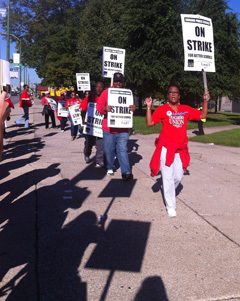On my fourth day as a Chicago Public Schools teacher, I had a student skip my class. I saved him a seat in the front row but spent third period algebra teaching to an empty chair. That chair was supposed to be filled with a football player who needs to be in his seat to play.
I waited until football practice ended that day, walked down the sweaty hallway to the locker room past the coaches and waited until he turned the corner.
As a center, he pushes 250-pound defensive linemen backwards without fail, but he couldn’t move me. Though I’m only a third his size, he froze.
“Where were you today?” I asked, but I already knew the answer.
He hung his head as his teammates laughed.
“Did you wait at the school just so you could find me after practice?” he asked.
“Yep. And I told both of your parents and all your coaches that you skipped math today. If you have any intention of playing this season, you’ll be in that seat I saved for you. So you’ll be here on Monday, won’t you?”

He put his head down, humbled.
“Yes, Miss Sammon. I’ll be there Monday.”
Except he wasn’t in his seat. He wasn’t in any seat. In fact, nobody was. And I wasn’t teaching either. My room has been completely empty for a week now, except for the moth that lives in my crooked desk.
From the picket line, decked-out in red with a sign in hand, I can see my classroom, room 221 at Chicago Vocational Career Academy at 87th and Jeffrey St. The lights are off. The lights are usually off because it’s too hot to leave them on during class, but the intellectual lights are off now too. That’s the worst kind of light to turn off.
The first day of the strike was going to be my fifth day on the job. There aren’t many things I know about being a teacher, about life on the South Side, about the union demands, or about the teacher’s needs. I can’t even pretend to understand the “legal-ese” involved in collective bargaining, the difference between a union delegate and a union chairperson, or why it takes a whole week to come to an agreement.
But here are a few of the things it doesn’t take five work days to figure out about Chicago Public Schools, which are the reason why I stand by my co-workers and picket.
— I teach with no textbooks. They were scheduled to arrive the day the strike started.
— I teach with no air conditioning, with no breeze, with screenless windows and while sweat gushes out of us all.
— I spend all the extra cash I have on getting notebooks, folders, pencils and paper for my students.
— I gave one kid my old backpack from college.
— I get $100 to spend on classroom materials for the whole year for all 35 of my students – enough to buy each student one folder, some paper and a classroom Nerf basketball and hoop for my quiz review game.
— I know my students know much more about how bad the world can be than I could ever understand. When one of their friends gets shot because of gang violence, they tape pieces of paper onto their collared uniform shirts that say “R.I.P.” to communicate the message to the rest of the school that someone from the neighborhood is gone forever.
— I know gangs can do good and bad things, by offering protection while issuing a disgusting amount of fear and anger.
— I know my students don’t just come to school to learn, they come for food, for shelter, for community, for an escape.
— I know every student craves learning, and deserves a safe, clean and comfortable environment to do so.
These are the reasons, not just money, that the Chicago Teachers Union needed to strike, and I actively stand with my co-workers.
But after a week, I’m not convinced a strike will fix these things. I’m not convinced it will buy my kids the pencils and backpacks they need. I’m not convinced that prolonging this strike will bring us a few fans or an air-conditioning unit. Striking won’t feed my students breakfast, lunch and dinner. Striking alone won’t stop the violence on south side street corners. Striking doesn’t necessarily raise ACT scores, send kids to college, or break the bonds of poverty and inequality.
Close this out and fill up the seats of room 221. Turn on the actual lights and the intellectual lights inside that room. Put my school’s football captain back in his seat, put the rest of my students back in their seats too. I’ll make sure I keep them there.
Molly Sammon ’12 is a first year Teach for America Corps Member and teaches high school special education at Chicago Vocational Career Academy. Email her at molly.t.sammon@gmail.com.